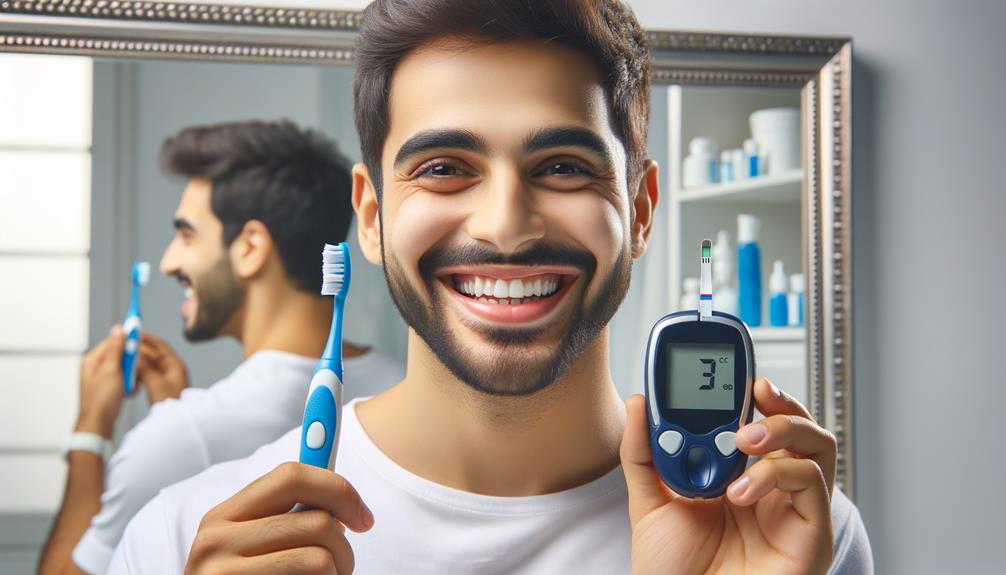As individuals with diabetes navigate their daily healthcare routines, it is important not to overlook the significant impact that this chronic condition can have on oral health. From tooth decay and gum disease to delayed wound healing, the implications of diabetes on oral health are vast and consequential.
However, by adopting a proactive approach and implementing effective dental care tips, individuals with diabetes can mitigate these health risks and promote overall well-being.
In this article, we will explore the essential dental care tips specifically tailored for diabetics, exploring the intricate relationship between diabetes and oral health and providing valuable insights to help individuals safeguard their smiles.
Key Takeaways
- Diabetes can increase the risk of tooth decay and cavities due to elevated sugar levels in saliva.
- Diabetics may have a weakened immune system, making it harder to manage oral infections.
- Certain diabetes medications can cause dry mouth, which increases the risk of tooth decay.
- Regular dental appointments, proper oral hygiene practices, and blood sugar control are essential for preventing and managing dental complications associated with diabetes.
Understanding the Link Between Diabetes and Oral Health
Diabetes can have a significant impact on oral health, leading to problems such as tooth decay, gum disease, and slow wound healing. Shocking right! but true…The high glucose levels in the blood can increase sugar levels in saliva, causing tooth decay and cavities. Additionally, diabetes weakens the immune system, making it harder to manage oral infections and periodontitis. Certain diabetes medications can also cause dry mouth, increasing the risk of tooth decay and plaque formation.
Recognizing the signs and symptoms of oral health issues related to diabetes is essential. Gum inflammation, frequent mouth ulcers, and oral fungal infections can be indicators of uncontrolled diabetes.
Practicing good oral hygiene is critical for diabetics. This includes brushing twice a day with a fluoride toothpaste, flossing daily, and using an antibacterial mouthwash. It is also important to maintain good blood sugar control through proper diet, exercise, and medication management. Regular dental check-ups are essential for early detection and treatment of any oral health issues.
Don’t forget that collaboration between dental and medical professionals is the best holistic approach to managing diabetes and its impact on oral health so as to provide comprehensive care and support to individuals with diabetes, helping to prevent and manage potential dental complications.
Dental Complications Associated With Diabetes
Here are some dental complications associated with diabetes in more details:
- Increased risk of gum disease and periodontitis: Diabetes weakens the immune system, making it harder to manage oral infections and periodontitis. This can lead to gum inflammation, bleeding, and eventually tooth loss if left untreated.
- Delayed wound healing after dental procedures: Poorly controlled diabetes can slow down the healing process, increasing the risk of complications after dental surgeries or extractions. It is important for diabetics to manage their blood sugar levels before undergoing any dental procedures.
- Higher risk of dental implant failure: Diabetics are more prone to dental implant failure due to impaired healing and increased susceptibility to infections. Proper oral hygiene and regular dental check-ups are essential to minimize this risk.
- Taste disturbances and salivary gland dysfunction: Diabetes can cause taste disturbances and alter the sense of taste. Additionally, salivary gland dysfunction can occur, leading to a dry mouth. Both these conditions can affect the enjoyment of food and increase the risk of tooth decay.
To prevent and manage these dental complications, diabetics should follow dental care tips specifically designed for their condition. Regular dental appointments, diligent oral hygiene practices, and maintaining good blood sugar control are key to maintaining optimal oral health. Collaboration between dental and medical professionals can ensure a holistic approach in managing diabetes and its impact on oral health.
Tips for Preventing Tooth Decay and Cavities in Diabetics

To effectively prevent tooth decay and cavities in individuals with diabetes, it is essential to implement proactive oral hygiene practices and maintain regular dental check-ups. Here are some important tips to help diabetics maintain optimal oral health:
- Monitor and Control Blood Sugar Levels: Keeping blood sugar levels within the target range is crucial for preventing tooth decay. Elevated blood sugar levels can increase sugar levels in saliva, promoting the growth of harmful bacteria that cause cavities.
- Brush Teeth Twice a Day with Fluoride Toothpaste: Brushing your teeth at least twice a day with fluoride toothpaste helps strengthen enamel and reduces the risk of tooth decay. Be sure to use a soft-bristled toothbrush and brush gently in circular motions.
- Floss Daily: Flossing is vital for removing plaque and preventing gum disease, which is a common issue for diabetics. Use dental floss or interdental brushes to clean between teeth and along the gumline.
- Regular Dental Check-ups: Regular dental appointments are essential for diabetics to detect and address oral health issues early. Dentists can provide professional cleanings, examine for any signs of tooth decay or gum disease, and offer personalized recommendations for oral care.
Managing Gum Disease and Periodontitis With Diabetes

As we may have outline previously,periodontal disease and diabetes mellitus can often coincide, the combination of which can exacerbate oral and overall health complications. When diabetes is not well-regulated, the risk of periodontal infection and tissue destruction heightens due to compromised ability to control inflammation and fight bacterial invasion. However, preventive self-care and clinical disease management strategies tailored to the patient can effectively stabilize the oral environment.
It is best to consistently aim for good glycemic control in diabetes so as to effectivly combat periodontitis. When blood glucose levels remain excessively high, inflammatory cytokines and markers like HbA1C elevate too, fostering rapid proliferation of harmful periodontal bacteria. Conversely, tightly monitored blood sugar facilitated by medications, lifestyle factors like nutrition and exercise, and regular physician guidance help minimize excessive Immunological responses that damage periodontal tissues. Simultaneously establishing diligent at-home oral hygiene habits fortifies the body’s resilience.
Some diabetes medications can cause dry mouth, increasing the risk of tooth decay and plaque formation. Staying hydrated and using saliva substitutes or sugar-free gum can help alleviate dry mouth symptoms and maintain oral moisture.
In terms of clinical solutions, regular professional dental cleanings, antimicrobial rinses, and antibiotic therapies aim to reduce pathogenic periodontal loads in a structured fashion, tempering bouts of tissue inflammation. For progressive cases, surgical procedures may become necessary to remove infected tissue and encourage healing of remaining sites. Additionally, coordinating ongoing treatment with a periodontist allows customized management as the conditions evolve. Overall, staying vigilant with medical teams while committing to thoughtful self-care proves critical for remaining healthy while managing both diabetes and periodontitis.
Collaborating With Dental and Medical Professionals for Holistic Diabetes Management

What are the benefits of collaborating with dental and medical professionals for holistic diabetes management?
When it comes to managing diabetes, a collaborative approach between dental and medical professionals can have a significant impact on overall health outcomes. By working together, these professionals can provide a more comprehensive and holistic approach to diabetes management, taking into account the health impacts on oral health.
This collaboration allows for early detection and intervention, leading to better management of the disease. Furthermore, integrated care can help identify and address potential oral health complications associated with diabetes. Dentists can work closely with medical professionals to develop personalized treatment plans that take into consideration the individual’s oral health and diabetes management needs.
This holistic approach ensures that all aspects of the disease are addressed, resulting in improved overall health outcomes for individuals with diabetes.
Frequently Asked Questions
What Are the Dental Advice for Diabetic Patients?
Dental advice for diabetic patients includes maintaining good blood sugar control. This can be achieved through regular monitoring, following a healthy diet, exercising regularly, and taking prescribed medication.
Another important aspect of dental care for diabetic patients is brushing teeth at least twice a day with a soft-bristled toothbrush. This helps remove plaque and prevent tooth decay. It is also recommended to use fluoride toothpaste, as it strengthens tooth enamel and protects against cavities.
In addition to brushing, flossing daily is crucial for diabetic patients. This helps remove plaque from between the teeth and along the gumline, preventing gum disease. Regular dental check-ups are also essential, as they allow for early detection and treatment of any oral health issues.
These practices are essential in preventing oral health problems associated with diabetes, such as tooth decay, gum disease, and slow wound healing. Diabetic patients are more prone to these issues due to impaired blood circulation and a weakened immune system.
How Does Diabetes Affect Dental Health?
Diabetes exerts a profound influence on dental health. It increases the susceptibility to tooth decay, gum disease, and compromised wound healing. Elevated blood glucose levels result in heightened sugar levels in saliva, which leads to cavities and dental decay.
Weakened immune systems in diabetics render them more susceptible to oral infections and periodontitis. Additionally, certain diabetes medications induce dry mouth, which exacerbates the risk of tooth decay and plaque formation.
To prevent and mitigate these oral health challenges, optimal oral hygiene, blood sugar management, and regular dental visits are imperative for diabetics. Collaborative efforts between dental and medical professionals foster a comprehensive approach to managing diabetes-related oral health issues.
Why Is It Important for Diabetics to Go to the Dentist?
Regular dental visits are crucial for individuals with diabetes due to the significant impact diabetes can have on oral health. Diabetes can lead to tooth decay, gum disease, and slow wound healing. By managing blood sugar levels, practicing good oral hygiene, and collaborating with dental professionals, diabetics can prevent and manage these dental issues effectively.
Dental check-ups can contribute to improving blood sugar control, slowing down disease progression, and reducing HbA1c levels. Making dental appointments a priority is essential for diabetics to maintain optimal oral health.
What Are the Complications of Diabetes Dentistry?
Complications of diabetes dentistry include:
- Increased risk of tooth decay
- Gum disease
- Slow wound healing
- Taste disturbances
- Altered sense of taste
- Salivary gland dysfunction
Diabetes can weaken the immune system, making it harder to manage oral infections and periodontitis. Certain diabetes medications can cause dry mouth, increasing the risk of tooth decay and plaque formation. Poorly controlled diabetes can also increase the risk of dental implant failure.
It is crucial for diabetics to:
- Practice good oral hygiene
- Manage blood sugar levels
- Have regular dental appointments
These measures can help prevent and manage these complications.
How Does Diabetes Affect Dental Health and Overall Well-Being?
Diabetes can significantly impact dental health. The link between dental health and diabetes lies in increased risk of gum disease, dry mouth, and slow healing of oral wounds. Maintaining good oral hygiene and regular dental check-ups are crucial for people with diabetes to prevent complications and maintain overall well-being.
Conclusion
In conclusion, individuals with diabetes must prioritize their oral health to prevent complications such as tooth decay and gum disease. By regulating blood sugar levels, practicing good oral hygiene, and seeking regular dental care, they can mitigate the risks associated with diabetes.
Remember, oral health is not separate from overall health; it is interconnected like the gears of a well-oiled machine. So, let us take charge of our dental care and keep our smiles shining bright, just like the key that unlocks our overall well-being.

